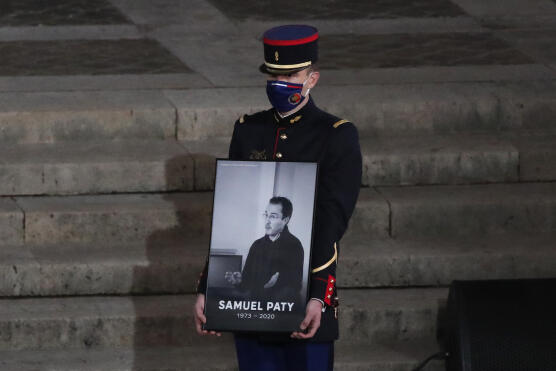In a sobering verdict that underscores the gravity of the 2020 beheading of French teacher Samuel Paty, a juvenile court in France has convicted six teenagers for their roles in the brutal killing that sent shockwaves through the nation.
The incident occurred after Paty showed cartoons depicting the Prophet Muhammad during a classroom discussion on free expression, prompting an extremist response that left the educator dead outside his school.
The assailant, a young Chechen who had become radicalized, met his demise at the hands of the police.
The recent court ruling, handed down on Friday, December 8, sheds light on the involvement of five defendants, aged 14 and 15 at the time, in staking out the teacher and identifying him for the attacker.
Additionally, a 13-year-old defendant was found guilty of spreading false information about the classroom debate, contributing to online anger against the teacher.
During the trial, the teenagers, all students at Paty’s school, maintained that they were unaware of the impending violence against the teacher.
Despite their claims, the court delivered brief or suspended prison terms to each of the convicted individuals.
Notably, the sentences include requirements for the teenagers to remain in school or secure employment during the duration of their suspended terms, coupled with regular medical checkups.
The courtroom atmosphere was tense as the verdicts were announced. The convicted teens, leaving without making any statements, displayed various emotional reactions.
Some hung their heads low, while one was observed wiping away tears. The complex nature of the case, involving young individuals caught in the web of extremism, underscores the challenges faced by authorities in addressing radicalization and its impact on youth.
The tragedy surrounding Samuel Paty’s death reignited debates on free expression, religious sensitivity, and the responsibilities of educators in navigating such delicate subjects.
The court’s decision serves as a stark reminder of the profound consequences that can arise from the intersection of education, extremism, and the digital age.
This conviction, albeit a somber conclusion to a tragic chapter, prompts broader reflections on the pressing need for societal dialogue, tolerance, and comprehensive efforts to prevent radicalization among the youth.
As France grapples with the aftermath of this disturbing event, it remains a poignant reminder of the importance of fostering understanding and open discourse to build a more resilient and united society.
This article was created using automation technology and was thoroughly edited and fact-checked by one of our editorial staff members



